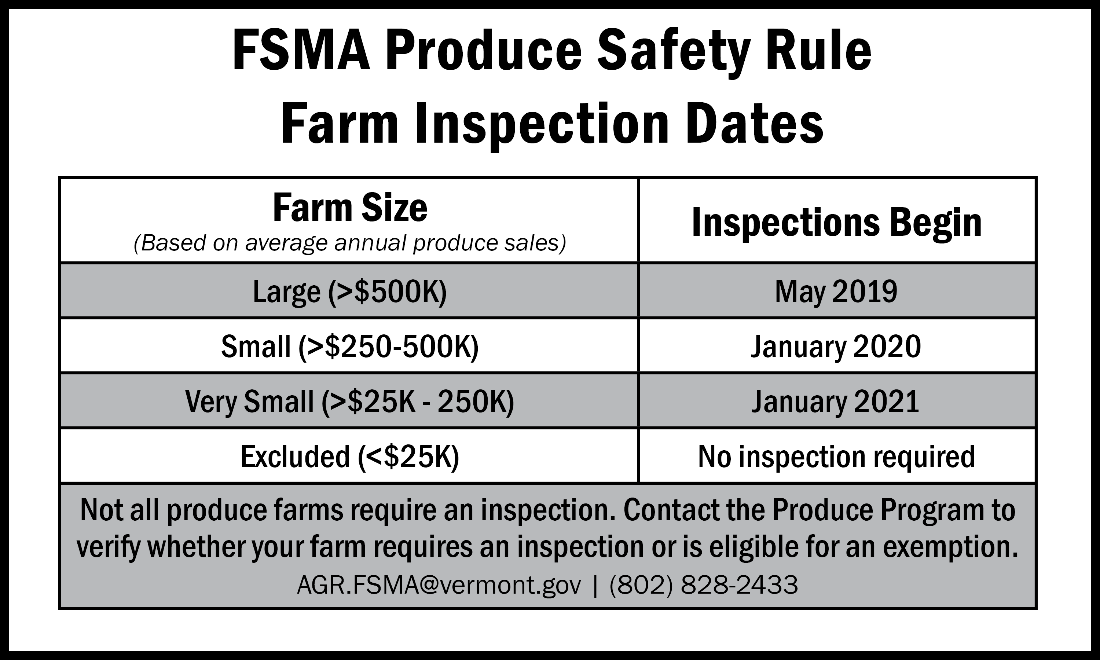By Tucker Diego, Vermont Agency of Agriculture, Food & Markets 
2019 is a watershed year for the handful of Vermont fruit and vegetable farms that will undergo initial inspections under the federal Food Safety Modernization Act’s (FSMA) Produce Safety Rule. These farms are required to adjust to a new set of standards, new terminology, and new Agency of Agriculture, Food & Markets inspectors.
This is why the Agency is dedicated to providing growers with the knowledge and resources needed to achieve compliance. The role of an inspector isn’t just to conduct produce safety inspections, but also to explain what the standards mean in the context of a farm’s operations and how growers can implement good agricultural practices to achieve compliance.
The good news is that many farms are well prepared by their participation in the USDA Good Agricultural Practices (GAP) or the Vermont Vegetable and Berry Growers Association Community Accreditation for Produce Safety (CAPS) programs. These programs help growers create produce safety plans and standard operating procedures to address common produce safety risks, including employee training plans, cleaning and sanitizing routines, and composting records.
Many Vermont produce farms have made great progress in other ways as well. Over 200 farms have already been in contact with the Agency to verify whether their farm requires an inspection or is eligible for an exemption, 85 individual growers have attended a Produce Safety Alliance Grower Training (a requirement for all farms undergoing inspections), and 18 farms participated in an On-Farm Readiness Review in 2018.
“Educate before and while we regulate” continues to be the Agency’s mantra as we transition into the first year of initial inspections. To this end, if an in-person conversation is your preferred method of learning, please feel free to contact an inspector directly (our contact information is provided at the end of this article).
Here are some additional tips to help growers adjust to the first year of inspections. Please stay in touch and keep your questions coming.
Does the Produce Safety Rule apply to your farm?
Any farm that sells produce is potentially subject to the regulation and should determine how the Produce Safety Rule applies to their farm.[i] In reality, a minority of farms are required to meet all requirements and undergo an inspection. Many other farms are eligible for an exemption with modified requirements, which must be reassessed on an annual basis.
Expect a friendly call, visit, or email from a produce safety inspector or another member of the Produce Program team in order to verify whether your farm is exempt or not. We need to verify whether or not an inspection is required even if your farm only grows a small amount of produce.
Make use of educational resources
Take steps to learn the Produce Safety Rule requirements if your farm requires an inspection. There are many ways to do this, such as by attending a Produce Safety Alliance Grower Training[ii], requesting an On-Farm Readiness Review[iii], reviewing the regulation and guidance documents, and by calling or sending us your questions. Links to additional resources can be found at the end of this article and on the Produce Program webpage[iv].
When do inspections begin?
Inspections begin for farms with average annual produce sales greater than $500,000 in May 2019. Inspections begin for farms with average annual produce sales between $250,000 and $500,000 in January 2020. Inspections begin for farms with average annual produce sales between $25,000 and $250,000 in January 2021.
What will inspections be like?
The purpose of an inspection is to assess a farm’s compliance with produce safety standards in order to help prevent and mitigate microbiological risks (such as foodborne pathogens). The inspector will schedule the inspection ahead of time during the growing season and will observe growing, harvesting, washing, packing and storage practices and will review key records and practices relating to worker training, soil amendments, agricultural water, wildlife and domesticated animals, and equipment, tools and buildings.
The inspector will explain what they’re assessing and why, and how produce safety requirements apply to a farm’s operations. If the inspector identifies an issue of concern, they will discuss potential corrective actions and preventative measures with the farm’s management. The inspector is able to provide educational and technical assistance resources throughout the inspection process.
It’s important to recognize that an inspection is not the same as an audit. There is no fee for an inspection, and inspections are not pass/fail or points-based. Instead, the outcome of an inspection may include written observations of produce safety issues that a farm should address in order to comply with the Produce Safety Rule. Failure to address these issues may result in a follow-up inspection or other enforcement measures necessary to ensure compliance and to prevent contaminated produce from entering commerce.
The Big Picture
Fresh fruits and vegetables that are often eaten raw are particularly vulnerable to harboring foodborne pathogens that can cause severe illness. Implementing science-based preventive practices help safeguard our fruits and vegetables and farm businesses from tragic outbreaks that can impact the entire industry and consumer confidence. Achieving compliance with the FSMA Produce Safety Rule helps ensure our continued access to fresh fruits and vegetables and the viability of Vermont farms that we want to support and see thrive.
Produce Safety Inspectors
Tucker Diego is a produce safety farm inspector at the Agency of Agriculture, Food & Markets. He’s worked for the Agency’s Food Safety & Consumer Protection Division for the past 2 years and has previously worked on VT and NH produce farms. He can be reached at (802) 622-4412 and tucker.diego@vermont.gov
Mike DiTomasso is also a produce safety farm inspector at the Agency. He was hired in August 2018 and has worked on produce farms in NY, CT, and VT as well as in agricultural education and outreach. He can be reached at (802) 505-3726 and michael.ditomasso@vermont.gov
Resources
[1]Produce Safety Rule Coverage Flowchart: go.usa.gov/xEaMC (case sensitive)
2Produce Safety Alliance Grower Training: bit.ly/2rOH77v (case sensitive)
3On-Farm Readiness Reviews: agriculture.vermont.gov/produceprogram/OFRR
4Vermont Produce Program: agriculture.vermont.gov/produceprogram

